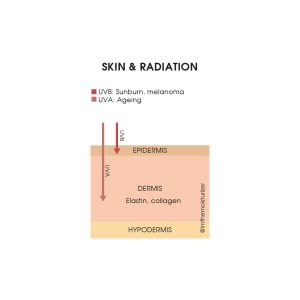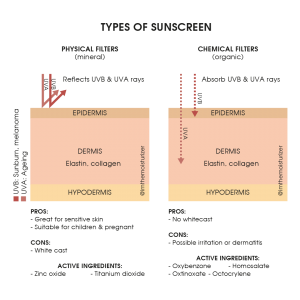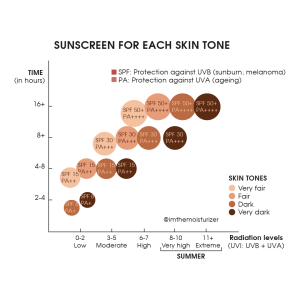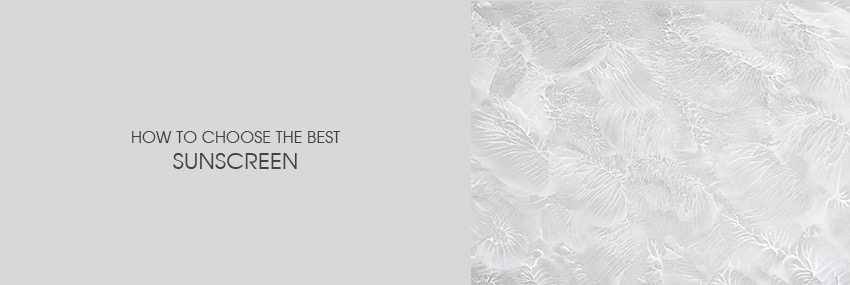Are you looking for a sunscreen but you don’t know how to choose one? Sunblock is the most important part of your morning skincare routine, so it’s essential to choose correctly to keep your skin healthy and beautiful. In this guide I’ll show you all muy tricks to find yourself a sunscreen you love!
Sunscreen is, without a doubt, the most important part of your beauty routine. I know I say it countless times, but we have to use a good sunscreen every day. If you want to avoid wrinkles, if you want to avoid spots or if you want to avoid melanoma, the best form of prevention is simple: always use sunscreen.
And why is it so important to choose a good product? Because the sunscreen is the first barrier of protection against the sun’s radiation, of which I already spoke in this other post. The sun emits ultraviolet radiation, which is invisible to the human eye and can be divided in three types: UVA, UVB and UVC. UVC rays are the most harmful, but they are absorbed by the ozone layer and do not reach us. UVB rays are what make our skin tan, but also those that can cause melanomas, since its activity fundamentally damages the most superficial layer of the skin. UVA rays are the most common ones, and even reach us through the windows and on cloudy days, reaching the inner layers of our skin and damaging elastin and collagen, making your skin age quickly. We can differentiate between two kinds of UVA radiation, considering their wavelength: UVA-I (340 nm – 400 nm) and UVA-II (315 nm – 340 nm).

Often, when we think of sunscreen we think of thick creams that smell like coconut and that leave you absolutely white for several hours. However, there are many sunscreens available today, so with this post I will help you find the one that best suits your needs. A good sunscreen can be used throughout the year (yes, in winter you have to use it too) without it being uncomfortable or overwhelming. And do you really need a specific product? Absolutely yes. Even though some moisturizers say they include SPF protection, the proportion of filters in them is incredibly small, so you should better use a proper sunscreen to give your skin the protection it needs.
In this post I will talk about the following topics:
1. TYPES OF SUNSCREEN.
All sunscreens can be divided into two broad categories: those that use physical filters and those that use chemical filters. These filters are the layer that remains on your skin and protects you against radiation, so it is interesting that you know the two of them to better understand what you want in your sunscreen.
Physical filters, also known as mineral filters, reflect the radiation of the sun, kind of like a shield. Normally, the ingredients that are used as a physical filter are zinc oxide and titanium dioxide. The main advantage of physical filters against chemical ones is that they do not penetrate the skin, but stay on the surface, so they are a great option if your skin is especially sensitive or has a tendency to dermatitis. Its main drawback? Sunscreens with a physical filter usually leave a white cast which, depending on the product, may take a few minutes to absorb or may remain on the skin. Sunscreens with physical filters are improving in this matter, and today many of them include nanoparticles that avoid such an unaesthetic effect and improve the application of the product.

Chemical filters, also known as organic filters, absorb ultraviolet radiation and transform it to prevent it from damaging your skin. Some of the most common ingredients in sunscreen with chemical filters are oxybenzone, oxtinoxate, homosalate and octocrylene. Their main advantage is that, when absorbed, they do not leave that white cast. However, since they absorb and penetrate the skin, they might cause irritation or dermatitis to those with the most sensitive skin.
Saying that one type of filter is better than another does not make sense, and in fact today many products contain a combination of both to provide a more effective result. It is true that in certain cases (children under three years or pregnant women, among others) it is convenient to use only physical filters, but in the rest of cases you can simply choose the one you like the most.
2. HOW TO CHOOSE THE BEST SUNSCREEN.
Now that you know how sunscreen can protect your skin it’s time to see what things you should look for when choosing the perfect sunscreen.
We all know the acronym SPF (Sun Protection Factor). These letters tell us about the time during which the sunscreen is effective before the skin begins to irritate when exposed to the sun. Depending on your type of skin and the time you are going to be exposed to the sun, it is recommended to use products with a higher SPF (the maximum is 50+) or a lower one. The main drawback of the SPF system when deciding if a sunscreen is the right one for us is that it only refers to its ability to protect us from UVB radiation, leaving the UVA aside. Anyway, keep in mind that in Europe sunscreen usually provides one third of the UVA protection than the UVB protection stated in the packaging.
To cover the shortcomings of the SPF system, other systems for classifying sunscreens have emerged; the main one is the PA system, which you may know if you have used Japanese or Korean sunscreens. It refers to the ability to protect against UVA radiation of a sunblock.
The PA system is based on the PPD (Persisteng Pigment Darkening) method, which assesses the pigmentation that persists on skin after being exposed to UVA radiation under controlled conditions. PPD is the most common method to evaluate the damage caused to our skin by UVA rays, although there are other possible in vitro tests. Depending on the PPD result obtained, a PA rating is established for each sunscreen.
- PA +: low protection.
- PA ++: moderate protection.
- PA +++: high protection.
- PA ++++: very high protection.
And now that you know the basic ways to classify the effectiveness of a sunscreen you will ask yourself: and which of the systems is the most important one? The answer is simple: both. Ideally, find a product that gives you high SPF protection (to ensure that UVB rays do not damage the surface of your skin) and a high PA (so that ultraviolet radiation does not damage the deeper layers of your skin). Being properly protected against radiation is key, and that implies protecting ourselves from the different kinds of radiation.

3. HOW TO USE SUNSCREEN CORRECTLY.
A lot of people use sunscreen wrong. This is due to three main causes: not using sunscreen daily, not using enough amount or not reapplying it.
By now you should know that using sunscreen every day is essential to take proper care of your skin. Damage caused by the sun can end up being irreversible and can turn very complicated, so you should dedicate a moment and make sure that your skin will be well protected. Studies on the effectiveness of sunscreens are made with the application of 2mg of product per cm2 of skin. Of course, the amount varies depending on the density of the cream you use, but probably you are not using enough and therefore you are not giving your skin all the protection it needs. To use sunscreen correctly you must take a generous amount, a good tip is to apply two lines of sunscreen, one over your index finger and another one over your middle finger, and spread it well all over the face, making sure to cover all areas.
You may ask yourself: and do I really have to reapply sunscreen? The answer is a very clear yes. Sunscreen loses effectiveness throughout the day, so if you re-apply it two hours after the first time you will ensure that your skin can face radiation without difficulty.
You must bear in mind that no sunscreen is capable of defending you against 100% of ultraviolet radiation. Products with SPF 100, for example, act on 99% of that radiation. Those with SPF 30 filter 97% of UVB radiation and those of SPF 50 on 98%. And is there any way to improve protection? The solution is simple: you can add to your skincare routine a good antioxidant that acts on free radicals that try to damage your skin during the day. So, with a good sunscreen and a good antioxidant serum like The Ordinary EUK 134 0.1%, which you can get on DECIEM (recommended) or the ByWishtrend Polyphenols in Propolis 15% Ampoule, which you can find on Wishtrend and on Yesstyle, you will give your skin all the protection it needs.
What is your favorite sunscreen? Do you have any questions about sunscreens? If you want to know more about the topic, leave me a comment and I will reply as soon as possible.
If you liked this post and want to continue learning about beauty, cosmetics and skin care, you are sure to take a look at these:
- How to change your beauty routine during summer.
- What skincare products can you use during pregnancy?
● Follow me on Instagram, Facebook, TikTok and Pinterest.
● Share, comment and like my posts on social media.
● Shop through my links to help me keep up with this blog.

I’m Nacho and I’m passionate about skincare. I really enjoy learning and sharing my knowledge about skincare and I read scientific papers so you don’t have to. I want to break stereotypes because I believe skincare has no gender: skin is skin.



Hola Nacho!
Haz probado Unseen sunscreen de Supergoop? Lo recomendarias para usarlo si se usa productos con Retinol? O deberia usar uno con un spf mas alto?
Hola Angela, bienvenida! 😊
La verdad es que no he probado ese protector solar, así que no te podría contar mi experiencia utilizándolo. Según he visto tiene un SPF40, por lo que si lo utilizas correctamente (cantidad, reaplicación, evitando la exposición al sol, etc.) puede ser una buena opción 🖤
Aquí te dejo un índice con todos mis artículos informativos, que seguro que te ayudarán a resolver más dudas 😉
Recuerda seguirme en Instagram, Facebook, Pinterest y TikTok y darle a me gusta, comentar y compartir las publicaciones para ayudar a más gente a cuidar mejor de su piel 🖤
Que pases un día estupendo,
Nacho.
I want to know how to know the best The ordinary products
Hi Salamatu, welcome to my blog! 😊
You can check my favorite products from The Ordinary here. If you’re thinking about purchasing some of the brand’s products, I’d advise you to do it here 😉
Here’s a list of all my informative posts, I’m sure you’ll find it useful! 🖤
Have a great day,
Nacho.